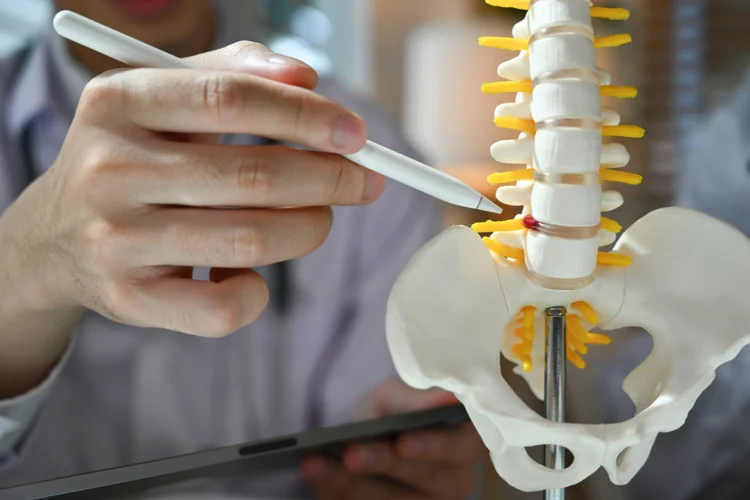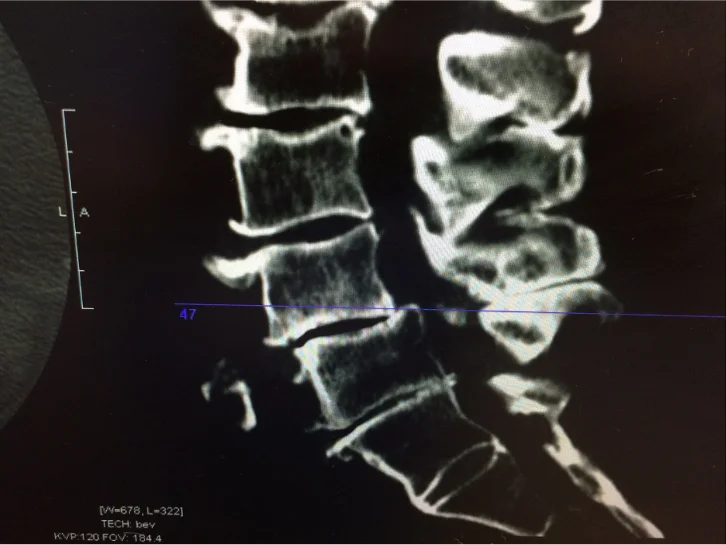Spine Specialist Singapore | Spine Clinic
Spinal pain and mobility issues may arise from herniated discs, fractures, or degeneration. Dr Foo offers comprehensive spine evaluations and evidence-based treatments to relieve symptoms, restore function, and support long-term spinal health.
MBBS (University of London) | MMed (Ortho) | FRCSEd (Ortho) | FAMS (Ortho)


What Does a Spine Specialist Do?

A spine specialist, such as an orthopaedic specialist or surgeon, diagnoses and
treats conditions affecting the spine, including back pain, neck pain, spinal injuries,
and degenerative disorders.
As the body's central support structure, the spine plays a vital role in movement, posture,
and nerve function. Damage or dysfunction can lead to persistent pain, restricted mobility,
and difficulties with daily activities, ultimately affecting your overall quality of life.
If you experience spinal discomfort, back pain, or neurological symptoms, early medical
attention is vital to prevent further deterioration and preserve long-term spinal
function.
Common Spine Conditions Treated
Spinal conditions treated by spine specialists can range from mild discomfort to severe, debilitating pain that interferes with daily activities. These conditions often develop due to ageing, injury, poor posture, or underlying medical disorders.

1. Chronic Pain & Nerve Disorders
- Sciatica – Compression or irritation of the sciatic nerve, leading to sharp, radiating pain, numbness, or weakness that travels from the lower back down to the leg.
- Radiculopathy – Compression of a spinal nerve root that causes pain, tingling, or weakness in the arms or legs.
- Facet Joint Syndrome – Inflammation or degeneration of the small joints in the spine.
- Myelopathy – Spinal cord compression that leads to weakness, numbness, and coordination difficulties, often progressing if left untreated.
2. Degenerative Spine Conditions
- Herniated Disc – A spinal disc disorder where the soft inner core pushes through the outer layer, irritating nearby nerves and causing pain, weakness, or numbness, often worsening with movement.
- Degenerative Disc Disease – The gradual breakdown of intervertebral discs, leading to loss of disc height, reduced cushioning between vertebrae, and chronic pain or stiffness.
- Spinal Stenosis – Narrowing of the spinal canal that puts pressure on the spinal cord and nerves, which may lead to pain, numbness, muscle weakness, and difficulty walking or standing for long periods.
- Spondylosis – Progressive degeneration of the spine due to ageing, which can cause stiffness, chronic pain, and reduced flexibility.

3. Spinal Injuries
- Fractures – Breaks or cracks in the vertebrae caused by trauma or osteoporosis, leading to severe pain, spinal instability, and in severe cases, nerve damage that can impair movement.
- Whiplash Injuries – Soft tissue damage in the neck resulting from sudden forceful movement, typically from car accidents, causing pain, stiffness, dizziness, and reduced range of motion.
- Sports-related Spinal Injuries – Strains, sprains, or spinal disc injuries from high-impact activities, which may cause localised pain, muscle weakness, and restricted movement, affecting athletic performance and daily function.
4. Postural & Functional Disorders
- Scoliosis – A condition where the spine curves abnormally sideways, potentially leading to back pain, uneven posture, and, in severe cases, breathing difficulties due to rib cage compression.
- Kyphosis – Excessive forward rounding of the upper back, often due to poor posture or spinal deformities, which can cause back pain, muscle fatigue, and difficulty maintaining an upright posture.
- Flat Back Syndrome – A condition where the lower spine loses its natural curvature, making it difficult to stand upright and leading to back pain and fatigue.
When to See a Spine Specialist?
You should consult a spine specialist if you experience any of the following symptoms:
- Persistent back or neck pain that lasts for more than a few weeks and does not improve with rest or home remedies.
- Numbness, tingling, or weakness in the arms or legs, which may indicate nerve compression or spinal dysfunction.
- Pain that worsens with movement or remains constant even while resting, affecting daily activities.
- Difficulty walking, standing, or maintaining balance, which could signal a serious spinal condition affecting nerve function.
- Loss of bladder or bowel control, which may indicate cauda equina syndrome or severe spinal cord compression, requiring immediate medical attention.

Diagnosis for Spinal Injuries & Conditions: What to Expect
At Apex Sports Clinic, diagnosing spinal injuries and conditions involves a comprehensive approach, including physical examination, clinical imaging, and nerve studies when necessary to assess spinal structure, nerve function, and mobility.
1. Medical History & Physical Examination
- Medical History Review – Evaluates past injuries, underlying conditions, lifestyle factors, and symptom patterns to identify potential causes of spinal issues.
- Physical Examination – Assesses posture, mobility, reflexes, muscle strength, and signs of nerve compression to detect functional limitations or abnormalities.
2. Imaging & Diagnostic Tests
- X-rays – Captures images of bone alignment and structural abnormalities such as fractures, arthritis, or disc degeneration.
- MRI (Magnetic Resonance Imaging) – Provides detailed visuals of soft tissues, spinal discs, nerves, and inflammation, useful for diagnosing herniated discs and nerve compression.
- CT Scan – Provides high-resolution imaging of bones and spinal structures to detect fractures, stenosis, or deformities.
- Electromyography (EMG) – Measures nerve activity to detect compression, damage, or dysfunction affecting muscle control and movement, particularly in conditions with neurological involvement.
Treatment Options for Spinal Injuries & Conditions
Treatment for spinal injuries and conditions varies depending on severity, underlying cause,
and
impact on daily function. At Apex Sports Clinic, we take a patient-centred and
progressive approach
to care.
Non-surgical treatments are the first line of management to relieve symptoms and improve mobility.
If conservative treatments are ineffective or significant nerve compression is present, surgical
intervention may be necessary to stabilise the spine and restore function.
Some of the specialised treatments we provide for spinal injuries and conditions include:
| Treatment | Description & Purpose |
|---|---|
| Injection-Based Treatments | Corticosteroid injections reduce nerve inflammation by delivering anti-inflammatory medication to the affected area. Radiofrequency ablation disrupts nerve signals to block pain transmission. These treatments offer temporary or prolonged relief for conditions like herniated discs or spinal stenosis. |
| Minimally Invasive Spine Surgery (MISS) |
Minimally invasive spine surgery relieves nerve compression and stabilises the spine with
smaller incisions and faster recovery.
|
| Spinal Fusion Surgery | Spinal fusion permanently joins two or more vertebrae to stabilise the spine and reduce pain from instability. It is commonly used for severe degenerative conditions, fractures, spondylolisthesis, spinal stenosis, and spinal deformities. |
| Artificial Disc Replacement (ADR) | Replaces a damaged spinal disc to preserve mobility and reduce pain caused by degenerative disc disease. It is typically recommended for disc-related pain with minimal spinal instability but may not be suitable for individuals with severe facet arthritis, osteoporosis, or spinal deformities. |
Cost of Spine Specialist Services in Singapore
| Spine Specialist Services | Estimated Cost (SGD)* |
|---|---|
| Consultation & Assessment | |
| Initial Consultation | From $200 |
| Follow-Up Consultation | From $150 |
| Second Opinion Consultation | From $200 |
| Diagnostic Services | |
| X-Ray | From $100 |
| MRI Scan | From $1,000 |
| CT Scan | From $1,000 |
| Electromyography (EMG) | From $800 |
| Nerve Conduction Study | From $800 |
| Non-Surgical Treatments | |
| Physiotherapy | From $200 per session |
| Shockwave Therapy | From $100 per session |
| Casting / Bracing | From $300 |
| Injection-Based Treatments | |
| Cortisone Injection | From $250 per injection |
| Facet Joint Injection | From $1,000 |
| Nerve Block Injection | From $3,000 |
| Platelet-Rich Plasma (PRP) Treatment | From $1,000 per injection |
| Radiofrequency Ablation (RFA) | From $3,000 |
| Ultrasound-Guidance for Injections (in addition to cost of injection) | From $150 |
| Minimally Invasive Surgical Procedures | |
| Endoscopic Spine Decompression | From $10,000 |
| Laminectomy | From $12,000 |
| Microdiscectomy | From $10,000 |
| Minimally Invasive Spinal Fusion (MISF) | From $15,000 |
| Traditional / Open Surgical Procedures | |
| Artificial Disc Replacement (ADR) | From $15,000 |
| Spinal Fusion Surgery | From $15,000 |
| Vertebral Fracture Fixation | From $15,000 |
*Prices listed above are estimates and may vary depending on the complexity of the condition, type
of procedure, and other clinical considerations.
For treatments or services not listed above, please contact
us to enquire further.
Choosing the Best Spine Specialist in Singapore
Finding the right spine specialist in Singapore depends on the nature of your condition,
treatment preferences, and long-term recovery goals.
There is no one-size-fits-all solution, as individual health needs and priorities vary.
Factors that may help guide your decision include:
- Clinical Focus – Some specialists may focus on specific spinal conditions such as disc herniation, spinal stenosis, or nerve-related disorders.
- Diagnostic Capabilities – Access to imaging tools like MRI, CT scans, and nerve studies supports timely and well-informed clinical assessments.
- Treatment Philosophy – Certain clinics may emphasise conservative care, while others integrate surgical options more readily based on clinical findings.
- Rehabilitation Support – Continuity of care, including physiotherapy and post-treatment follow-up, plays an important role in supporting long-term recovery and functional outcomes.
Most importantly, selecting a spine specialist who aligns with your expectations, communication
style, and recovery goals can contribute to a more positive care experience.
To better understand what treatment path suits you, consider speaking with our friendly and experienced doctors at Apex
Sports Clinic.
Every patient deserves a treatment plan tailored to their needs. We start with non-surgical approaches before considering more invasive interventions.
Find an Orthopaedic Spine Specialist Near Me
Apex Novena
admin@apexsportsclinic.sg
101 Irrawaddy Rd, #18-12 Royal Square Medical Centre, Singapore 329565
Nearest MRT: NS20 Novena
Apex East Coast
admin@apexsportsclinic.sg
112 E Coast Rd, #03-03/04 i12 Katong, Singapore 428802
Nearest MRT: TE26 Marine Parade
Why Do Patients Choose Apex Sports Clinic?
Sports Doctor in Singapore: Personalised & Affordable Care
Progressive Treatment Philosophy
We prioritise personalised, non-invasive solutions, progressing to specialised treatments, including surgery, only when needed for more effective and targeted care.
Holistic Patient-Centred Care
From diagnosis to rehabilitation, we provide comprehensive and seamless care for a wide range of orthopaedic conditions.
Specialist in Sports Orthopaedics & Injury Management
We combine expert injury management with a proactive approach to maintaining your body’s strength and function, so you can recover fully and perform at your peak.
Patient Journey
1 . Schedule Your Appointment

2 . Expert Diagnosis & Consultation

3 . Customised Treatment Plan

Schedule an Appointment

Our Insurance Partners






Frequently Asked Questions (FAQs)
An orthopaedic spine specialist or neurosurgeon is typically recommended for diagnosing and treating spine problems, depending on the nature and complexity of the condition. Orthopaedic specialists focus on spinal bones, joints, and stability, while neurosurgeons are trained to manage spinal cord and nerve issues. Both specialists are equipped to offer non-surgical and surgical treatments.
The cost of spine surgery in Singapore varies depending on the procedure type, hospital, surgeon’s fees, and use of implants or specialised techniques. Costs can also be influenced by insurance coverage and hospital class. It is best to check directly with your chosen clinic or surgeon to obtain an accurate and personalised cost estimate based on your specific condition and treatment plan.
An orthopaedic spine specialist or a neurosurgeon is typically consulted for diagnosing and managing an L4-L5 disc bulge. These specialists use clinical evaluation and imaging to assess the severity of the condition and its impact on surrounding nerves. Non-surgical treatments such as physiotherapy or injections are often recommended first, while surgery may be considered if symptoms persist or worsen.
The cost of spine surgery for an L4-L5 disc condition in Singapore varies depending on the type of procedure, hospital, surgeon’s fees, and use of implants. Additional factors such as the complexity of the surgery and length of hospital stay can also influence the total cost. It is best to consult your chosen clinic or surgeon to confirm the estimated cost and determine if the surgery is appropriate based on your specific condition.
Spinal surgery carries certain risks, including infection, nerve injury, blood clots, or incomplete symptom relief, similar to other major surgeries. The degree of risk depends on factors such as the type of procedure, the patient’s overall health, and the complexity of the spinal condition. It is advisable to consult your spine specialist to determine if surgery is appropriate for your condition and to fully understand the potential risks and benefits.
There is no strict age limit for spinal surgery, as candidacy depends more on overall health, bone quality, and treatment goals than on age alone. Older adults may still benefit from spinal procedures if they are healthy enough to undergo surgery and rehabilitation. If you are experiencing spinal issues, it is best to consult a spine specialist to determine whether spinal surgery or alternative treatments are more appropriate based on your specific condition and needs.
Spinal surgery can cause postoperative pain, which varies depending on the procedure, individual pain tolerance, and recovery progress. Pain typically improves over time with appropriate pain management and rehabilitation strategies. It is best to discuss with your surgeon to help you understand what to expect after surgery and what measures can be taken to minimise discomfort during recovery.
Back surgery may not be recommended for individuals with poorly controlled medical conditions, severe osteoporosis, widespread spinal instability, or when symptoms can be managed without surgery. Non-surgical treatments are often prioritised unless they are ineffective and surgery offers clear functional benefits. It is best to consult your specialist to determine the most appropriate treatment options based on your specific condition and overall health.
Good candidates for spine surgery typically have persistent symptoms that do not improve with conservative treatment and imaging evidence of a surgically treatable condition. Surgery is often considered when spinal instability, nerve compression, or significant pain affects daily function. It is best to consult a spine specialist to determine whether spinal surgery or another treatment option is more appropriate based on your specific condition and overall needs.

